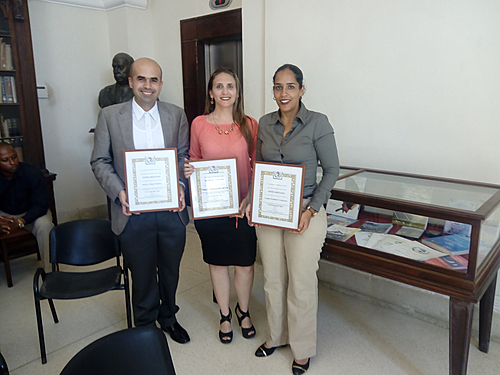
Despite the difficulties imposed by more than 60 years of blockade, Cuba is an international reference in the development of science. Unlike other countries, this development is not based on the military industry or the pursuit of corporate profitability. On the contrary, it is driven by the search for solutions to social problems.
This priority was highlighted by the award given to Cuban scientist Yailé Caballero Mota. A member of the World Academy of Sciences and Director of International Relations at the University of Camagüey, Mota was one of the recipients of the Sofia Kovalevskaya Prize for her research on ataxia, a neurodegenerative disease caused primarily by damage to the part of the brain that deals with movement, coordination and balance. It is a hereditary and degenerative disease of the nervous system. The most frequent manifestations are postural instability, muscle cramps, cognitive disorders, sleep anomalies, etc.
“I am very proud to have received the Sofia Kovalevskaya Prize. I accept this award on behalf of women scientists and specifically those of us who contribute to mathematical and computer science. it also represents a commitment and new challenges with my research group, with my students, to contribute more and more to the development of society through our science, which is artificial intelligence”, says the scientist in an interview with Brazil in fact.
Mota is part of a team that researches and develops the study of intelligent techniques in the acquisition of knowledge about ataxia.
“We carried out the study of intelligent techniques in the acquisition of knowledge about ataxias, due to the severity of this disease and its prevalence in the country, especially in the eastern region. In this research, intelligent techniques are used to predict the progression of SCA2 [um tipo de ataxia]analyzing data on its progress in a group of patients and [em um grupo de] control, using methods based on prototypes”, he says.
The Unesco award is an incentive for women scientists from middle and low-income countries. The prize is named after Russian mathematician, socialist and feminist Sofia Vasilievna Kovalevskaya (1850-1891), who was the first woman professor of mathematics in Europe.
Do androids dream of electric sheep?
Mota is a pioneer in several areas of research on the island. Born into a medical family, she comments that she was interested in mathematics from an early age. It was this interest that led her to study informatics, one of the sciences that has changed the most in recent years. “When I was studying, computers took up whole rooms, they were these giant machines,” she remembers with a smile as she points to her cell phone, a small computer that she keeps in her pocket.
At the Sleep Clinic of the Cuban Neuroscience Center, she did her graduation thesis, developing an automatic generator of rules for classifying sleep stages. Shortly after presenting her thesis, she joined the Artificial Intelligence research group at the University of Camagüey. For 20 years, she has been leading this team, with which she has developed intelligent applications to solve problems in areas such as meteorology, civil engineering, biotechnology, tourism development, health, food production, education, efficient energy management, among others.
The rapid developments of artificial intelligence in fields as diverse as artistic creation, communication or medicine are generating great debates about the use of these technologies. Many opinions are divided between those who reject these technologies and those who argue for them.
Mota believes that the State should have control over the use of the tool, through regulations and conventions. She argues that free use of the market can lead to negative developments.
“An example of the application of our research was the acquisition of knowledge about the lethality of covid-19. As soon as the pandemic began in our country, using artificial intelligence techniques, we were detecting the patterns, the variables that could lead to the fatal development of this disease. And it was precisely with artificial intelligence techniques. In other words, many contributions were made to knowledge from artificial intelligence to interpret the disease, to fight the pandemic”, he says.
Science is named after a woman
The scientist claims that Cuba “is a country that trusts women” and highlights the increase in female participation in candidacies for the National Assembly, but points out that prejudice is a reality in Cuban society: “There are still gaps and barriers in society that need be overcome”.
She remembers that when she attended university, there were very few women who studied with her. In general, science seemed to be something reserved for men. However, she notes that this has begun to change in recent years. Mota now teaches at the same university where she studied, and she says it has a growing number of female students. However, although there have been important advances, she points out that “still today we find male chauvinists who fail to recognize the leadership of women in the workplace and in the profession”.
Editing: Thales Schmidt
Source: www.brasildefato.com.br

